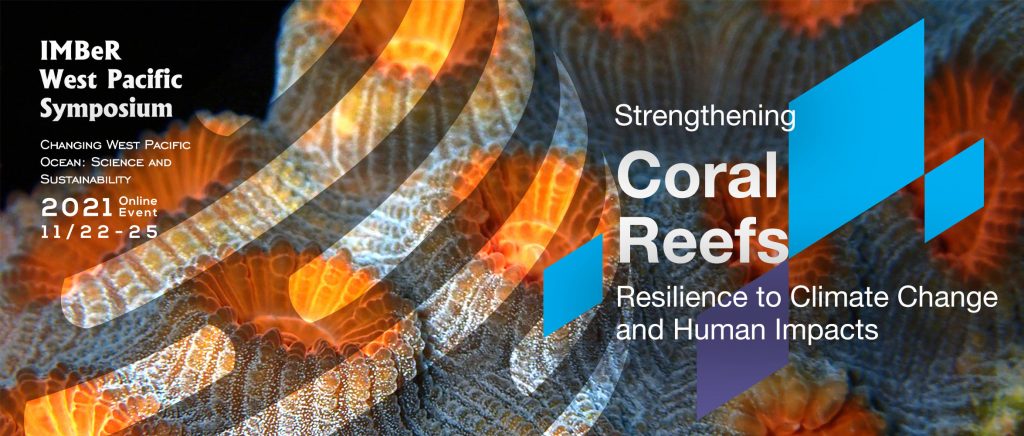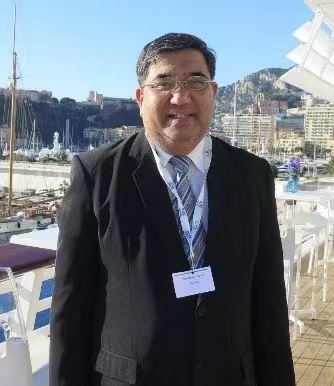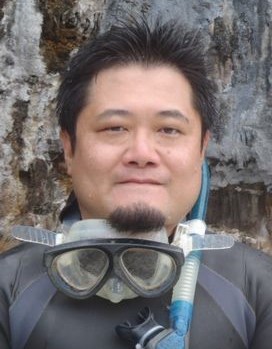Session 2: Strengthening Coral Reef Resilience to Climate Change and Human Impacts

About this session
Coral reefs and associated ecosystems are among the most valuable resources on the earth. They contain the highest biodiversity and provide many important ecosystem services, especially the protection of coastlines from storms and erosion, provide jobs for local communities, source of food, tourism benefit to local businesses, source of nitrogen and other nutrients for marine food chains, and new medicines. However, coral reefs are severely affected by natural disturbances, particularly heavy storms, diseases and predators, and anthropogenic disturbances, including sedimentation, pollution, destructive fishing, overfishing, and climate change, which is resulting in elevated seawater temperatures and ocean acidification. Coral bleaching events affected most coral reef ecosystems worldwide. To reverse the global coral reef degradation trends, scientists have required better management strategies that focus on strengthening coral reef resilience, people to rely on, and economies. Resilience is defined as the capacity of a system to withstand stressors, maintain its structure and function in the face of disturbance, and adapt to future challenges. It may be useful as a guiding framework for coral reef management in the face of rapid global change. In this session, scientists and researchers are invited to exchange their experiences in research, management, monitor and conservation aspects, focusing on coral reef resilience, including current and future applications, and any aspects to strengthen coral reef resilience to climate change and human impacts. The presentation aspects may include, but are not limited to coral reef monitoring, biogeochemical and ecological processes for enhancing coral reef resilience, impacts of climate change and other human activities on the health of corals, coral bleaching, reduction of local threats, coral restoration, sustainable use and management of coral reefs, and innovative studies.
Keynote Speakers

Peter J. Mumby, University of Queensland, Australia
Keynote title: Rising to the Challenge of Managing the Impacts of Coral Bleaching
Professor Peter Mumby began his career helping to design marine reserves in Belize and experienced first hand the limited scientific basis for decision-making. He then began a research pathway with a goal of providing science that can inform practical conservation and management action. His research combines field observations, experiments, remote sensing, and ecological modelling to answer questions about ecosystem resilience, impacts of climate change, marine reserve functioning and design, connectivity of ecosystems, coral reef fisheries, and marine spatial planning to capture ecosystem services. To achieve this, Peter’s students and post-docs work on a variety of taxa and processes including corals, algae, sponges, herbivory, predatory fishes, food web models, metapopulation models, and so on. He collaborates extensively with friends in other fields including economics, engineering, oceanography, and business. Peter undertook a PhD at the University of Sheffield (UK), followed by a NERC Post-doctoral fellowship at the University of Newcastle. This was followed by a Royal Society fellowship at the University of Exeter (UK), and a move to Brisbane to take up a prestigious ARC Laureate Fellowship in 2010. He is currently a Professor at the University of Queensland (School of Biological Sciences).
Peter is a Pew Fellow in Marine Conservation and winner of the Rosenstiel Award for Contributions to Marine Biology, Marsh Award for Marine Conservation, and the inaugural ISRS Mid-Career Award for contributions to reef science. Peter has published more than 300 papers, is an ISI highly-cited researcher, and has an h-index of 100. He is happiest on a coral reef with a camera in his hands.C

Makoto Tsuchiya, University of the Ryukyus, Japan
Keynote title: Payments for Ecosystem Services Offered by Coral Reefs
Makoto Tsuchiya, Professor Emeritus of University of the Ryukyus, Japan.
M. Tsuchiya was born on November 1, 1948. He was fascinated biology from a very young age. After graduating from the graduate school of Tohoku University in 1976, he joined the staff of the marine biological station of the same university in northern Japan. His doctoral research thesis was on the tidal flat ecology, focusing on the bioturbating activity of benthic animals. Organization processes of mussel bed community were also his main research topic there.
He moved to University of the Ryukyus, Okinawa, southern Japan, in 1983 and spent his career until now. Much of his work focused on the organization of marine communities such as coral associated animals, and function of island and coral reef ecosystems with reference to the ecosystem services. He has contributed in the field of coral reef science as the former president of the Japanese Coral Reef Society and the secretary general of Pacific Science Association in various ways, particularly emphasizing the importance of ecosystem networks.
These research topics were discussed in his several books such as Anguish of Coral Reefs, Ecology of Friendships (in Japanese) and Paradise of Nature.
Co-moderators

Thamasak Yeemin, Ramkhamhaeng University, Thailand
Thamasak Yeemin is a head of the Marine Biodiversity Research Group, Department of Biology, Faculty of Science, Ramkhamhaeng University and a president of the Marine Science Association of Thailand (MSAT), in Bangkok, Thailand. His education background includes a doctoral degree in biology from Kyushu University, master degrees in biology from the University of the Ryukyus, and in marine biology from Chulalongkorn University. He has worked in many aspects of ecology, biology, environmental science, socio-economics, coastal ecosystem management and marine protected areas for nearly 30 years in Thailand and other parts of the Western Pacific. He has provided expertise to several management agencies, including local governments, national institutions, international organizations and NGOs, to design and implement management plans for coastal resources and the environment. He is a national focal point for coral reef component under the UNEP/GEF Project on Reversing Environmental Degradation Trends in the South China Sea and Gulf of Thailand. He is also a founding member of the Asia Pacific Coral Reef Society and a former councilor of the International Coral Reef Society (ICRS). He has worked for some regional collaborative projects under international organizations, such as the IMO, IOC WESTPAC, ASEAN Center for Biodiversity, GIZ, etc.

Takashi Nakamura, University of the Ryukyus, Japan
Takashi Nakamura is an Associate Professor with 11 years of experience working at the Faculty of Science, University of the Ryukyus in Okinawa, Japan.
Dr. Takashi Nakamura is a researcher specializes in coral reef ecology and physiology of corals. His main focus is the long-term dynamics of coral population ecology as well as the changes in community structure under the threat of local and global stressors. He is also working as the Expert Member of Okinawa Prefectural Promotion Council, Sekisei Lagoon Natural Restoration Council, Chairman of the Academic Research Committee (Ministry of the Environment), Advisor for the Ecosystem Subcommittee (Coastal Zone), Review committee member for the project to promote monitoring of important ecosystem monitoring areas (Monitoring sites 1000; Coral reef survey), Kyushu-Okinawa Regional Council for Climate Change Adaptation as well as the member of the Ministry of the Environment’s Coral Reef Ecosystem Conservation Action Plan Review Committee. He had been working as a chief advisor for Palau coral reef Island ecosystem project (P-CoRIE) led by JICA/JST for 2012 to 2018. He received Univ. Ryukyus President’s award in 2004 and the Siro Kawaguti award for young scientist in 2008.
- Deadline for abstracts: Extended to 10 October
- An example abstract is provided here
This session contributes to the following IMBeR Grand and Innovation Challenges
Grand Challenges

Grand Challenge I
Understanding and quantifying the state and variability of marine ecosystems

Grand Challenge II
Improving scenarios, predictions and projections of future ocean-human systems at multiple scales

Grand Challenge III
Improving and achieving sustainable ocean governance
Innovation Challenges
Innovation Challenge 3
To Advance Understanding of Ecological Feedback in the Earth System
Innovation Challenge 4
To Advance and Improve the Use of Social Science Data for Ocean Management, Decision Making and Policy Development
Innovation Challenge 5
Interventions to change the course of climate impacts
Innovation Challenge 6
Sustainable management of Blue Carbon ecosystems